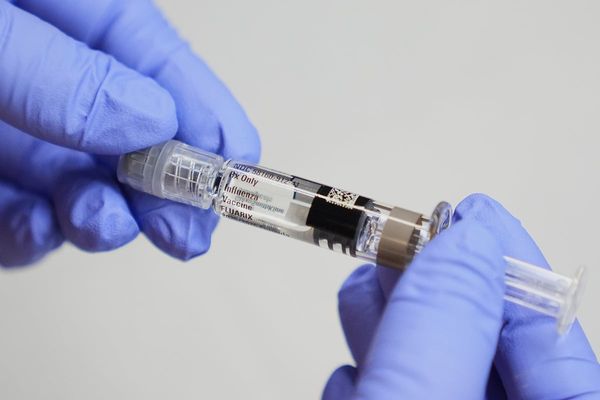Novo Nordisk stock surged Friday after the obesity kingpin reported strong results for its next-generation weight-loss drug, amycretin.
Over the course of 36 weeks, patients who took the highest dose of the weekly shot lost 22% of their body weight. That compares with a 2% weight gain for the placebo group.
The results line up favorably with Eli Lilly's Zepbound, which at best has shown 22.5% weight loss over 72 weeks. They also appear to outperform Lilly's next-generation drug, retatrutide, William Blair analyst Andy Hsieh said in a client note.
Novo Nordisk stock jumped 8.5% to close at 87.97.
Shares of other weight-loss players diverged on Novo Nordisk's news. Lilly stock rose 2.5% to 785.41, while Viking Therapeutics shares yo-yoed and eventually closed down 1.3%, at 34.50. Amgen, which is also working on a weight-loss shot, shed 1.8%, closing regular trades at 275.42.
Moving On From Wegovy?
Amycretin works differently from Novo Nordisk's blockbuster obesity drug, Wegovy. Wegovy mimics the GLP-1 hormone to improve feelings of satiety and markers of blood sugar. Novo also sells the same active ingredient as a type 2 diabetes treatment called Ozempic.
Amycretin, on the other hand, mimics both the GLP-1 hormone and a hormone called amylin. The latter plays a role in regulating blood sugar levels. It also slows how fast the stomach empties itself.
The highest dose Novo Nordisk tested was 20 milligrams. At 1.25 milligrams, patients lost 9.7% of their body weight over 20 weeks. Another group received a 5-milligram dose for 28 weeks and lost 16.2% of their body weight.
Lilly's Zepbound and Viking's experimental VK-2735 use another mechanism. They mimic GLP-1 and GIPR. GIPR, or the GIP receptor, increases energy expenditure and reduces food intake.
Hsieh says the results affect Viking Therapeutics in two opposing ways. On one hand, Viking is working on an amylin-based drug that could begin clinical testing this year. The results from Novo support the amylin approach, he said.
"However, we believe that amycretin has potential to emerge as a viable competitor to the GLP-1/GIP dual agonist approach," he said. "As a result, we expect Viking shares to be volatile with a downward bias."
Facing Off With Eli Lilly
The results could help bolster Novo Nordisk against Eli Lilly. In a head-to-head study, Zepbound patients lost an average 20.2% of their body weight over 72 weeks, while Wegovy recipients had a 13.7% reduction in body weight.
Meanwhile, Lilly's next-generation weight-loss drug, retatrutide, is looking less bullish compared with amycretin. Retatrutide works by mimicking three hormones: GLP-1, GIPR and glucagon. The middle 5-milligram dose of amycretin looked similar to retatrutide, while the lowest dose looked similar to Zepbound, William Blair's Hsieh said.
In December, Novo's CagriSema — another drug targeting amylin and GLP-1 — disappointed in a Phase 3 study. Patients lost 22.7% of their body weight over 68 weeks. That topped the 16.1% weight loss for Wegovy recipients, but missed Novo's guidance for 25% weight loss.
"Novo could leverage amycretin as an alternative to Lilly's Zepbound or retatrutide, though the exact strategic positioning will likely be clarified with full data," Hsieh said.
Pill Space Heats Up
Novo is also developing amycretin as a once-daily pill.
In March 2024, Novo Nordisk said patients who took a daily pill of amycretin lost 13.1% of their body weight, topping the placebo group by 11.9%. But that came alongside numerous side effects. Three-quarters of patients experienced nausea and 56% had vomiting, Leerink Partners analyst David Risinger said in a report.
To compare, just 31% and 12% of patients in Lilly's 72-week study of Zepbound experienced nausea and vomiting, respectively.
Still, the race to develop a weight-loss pill is on and a slew of competitors have lined up. But most are betting on mimicking GLP-1 alone or GLP-1 and GIPR. Lilly, Viking, Pfizer, Roche and AstraZeneca are all on the field.
Follow Allison Gatlin on X/Twitter at @IBD_AGatlin.







